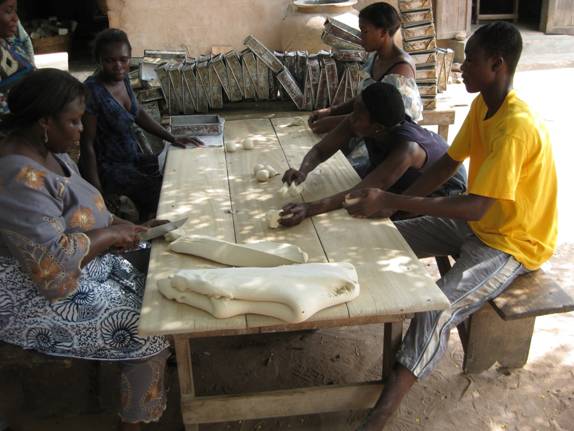Life in the Aid World: Caught Red-Handed, No Consequences
Last week, a report in USA Today brought to light a story of aid funds going badly astray. In case you have not followed the story, it seems that back in 2003, USAID contracted with the UNDP and UNOPS to complete a series of “quick impact” infrastructure projects in Afghanistan, to build badly needed roads, bridges, and community buildings. A US government report on the project, sparked by a tip from an anonymous complainant, found that many of the projects reported as “complete” by the UN were in fact unfinished or had such “life-threatening oversights” that they could not be used. The USA Today reporter filed a Freedom of Information Act Request to access the government report, which he then published along with the article.
Here are a few highlights of the report:
- According to a former UNOPS employee, some $10 million of the USAID grant funds was diverted to projects outside of Afghanistan, in Sudan, Haiti, Sri Lanka and, most memorably, Dubai.
- The UNDP withdrew $6.7 million of project funds in 2007, after the project had ended and without USAID’s knowledge. The investigators could not pin down how those funds were spent.
- A bank was built for $375,000 without electricity, plumbing or proper drainage. The report found that the basement had flooded, destroying stacks of money, and the walls were rotting.
- A $250,000 bridge, reported as “completed,” was dangerous and unusable, having been designed too small for the site where it was built.
- An airstrip budgeted at $300,000 actually cost $729,000 to build. After a description of the major engineering flaws in the construction of the airstrip, the report concluded that military planes cannot safely land there and that “erosion rills or ruts will continue to expand until they reach the runway itself, destroying it completely.” In other words, USAID paid $729,000 for a patch of mud.
- There may be more to come: “questions remain unanswered” because several UN officials refused to be interviewed and the UN failed to provide requested documents during the investigation.
USAID is also to blame for choosing such a bad contracting arrangement, and for not having procedures to catch this earlier and seek full compensation. USA Today reported:
Federal prosecutors in New York City were forced to drop criminal and civil cases because the U.N. officials have immunity. USAID has scaled back its dealings with the U.N. and hired a collection agency to seek $7.6 million back, Deputy Administrator James Bever said. The aid agency hasn't heeded its inspector general's request to sever all ties.
"There are certain cases where working with the U.N. is the only option available," Bever said in an e-mail.
At a UN briefing last week, the UNDP spokesman said that “there have already been a number of meetings, including at the highest level of UNDP and USAID, to work through this matter.” He said that he expected that the UNDP would have to pay USAID no more than $1.5 million.
A disastrous aid outcome, exposure in the mass media -- so what were the consequences? A number of meetings, possibly some money back, USAID disregards its own Inspector General’s request to break off ties with the UN (some unspecified “scaling back” except in other unspecified “certain cases”), and yet more meetings “at the highest levels.”
Since the initial reports, there has been no further media coverage or commentary except for an editorial critical of USAID in the Las Vegas Sun on April 17th. The USAID web site accessed on Monday, April 20, 2009 still listed as implementing partners UNDP (who announces it “remains responsive to the changing needs of a nation still in transition from conflict to peace”) and UNOPS (“we help our clients turn ideas into reality.”)
The USA Today story broke the same day that a USAID rep presented at a meeting in Washington called "Open Innovation for Government: Answering President Obama's Call for More Open, Effective Public Service."
 From Aid to Equality
From Aid to Equality




 I was startled during a meal at a non-luxury restaurant out in the boondocks in Ghana when my Ghanaian hostess suggested I check out the bathrooms. Lo and behold, they were indeed incredibly clean and hygienic. The reason seemed to be given by the following sign outside the lavatory.
Apparently this private firm had won a lot of bathroom-cleaning contracts as a way to promote its own cleaning products for the homes of the Ghanaian middle class (I wish some entrepreneur in the US would think of this for our disgusting gas station bathrooms).
I was startled during a meal at a non-luxury restaurant out in the boondocks in Ghana when my Ghanaian hostess suggested I check out the bathrooms. Lo and behold, they were indeed incredibly clean and hygienic. The reason seemed to be given by the following sign outside the lavatory.
Apparently this private firm had won a lot of bathroom-cleaning contracts as a way to promote its own cleaning products for the homes of the Ghanaian middle class (I wish some entrepreneur in the US would think of this for our disgusting gas station bathrooms).

 Individual liberty is a precise concept and a powerful ideal. It has an enormous moral appeal – “all men are created equal, and are endowed by their creator with certain inalienable rights, that among these are life, liberty, and the pursuit of happiness.” Jefferson wrote these words even though there was only liberty for propertied white males at the time in the US, but these words would serve as a beacon through American history, which Lincoln would invoke to motivate the Emancipation Proclamation, and which Martin Luther King would invoke to end Jim Crow and get de-facto voting rights for blacks.
Individual liberty is a precise concept and a powerful ideal. It has an enormous moral appeal – “all men are created equal, and are endowed by their creator with certain inalienable rights, that among these are life, liberty, and the pursuit of happiness.” Jefferson wrote these words even though there was only liberty for propertied white males at the time in the US, but these words would serve as a beacon through American history, which Lincoln would invoke to motivate the Emancipation Proclamation, and which Martin Luther King would invoke to end Jim Crow and get de-facto voting rights for blacks. Not sure what to make of this, so I just state the facts: an African-American record producer arranged to have well-known African singers do U2 songs for this album. U2 obviously had to sign off on an album in which Africa thanks U2 with U2 songs, due to copyright laws, and in fact the producer thanks U2 band members.
Not sure what to make of this, so I just state the facts: an African-American record producer arranged to have well-known African singers do U2 songs for this album. U2 obviously had to sign off on an album in which Africa thanks U2 with U2 songs, due to copyright laws, and in fact the producer thanks U2 band members.